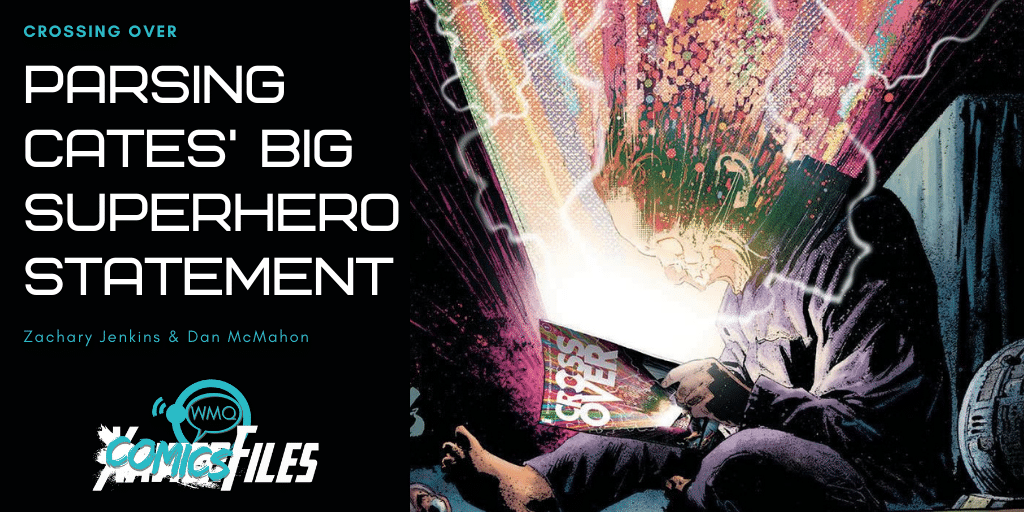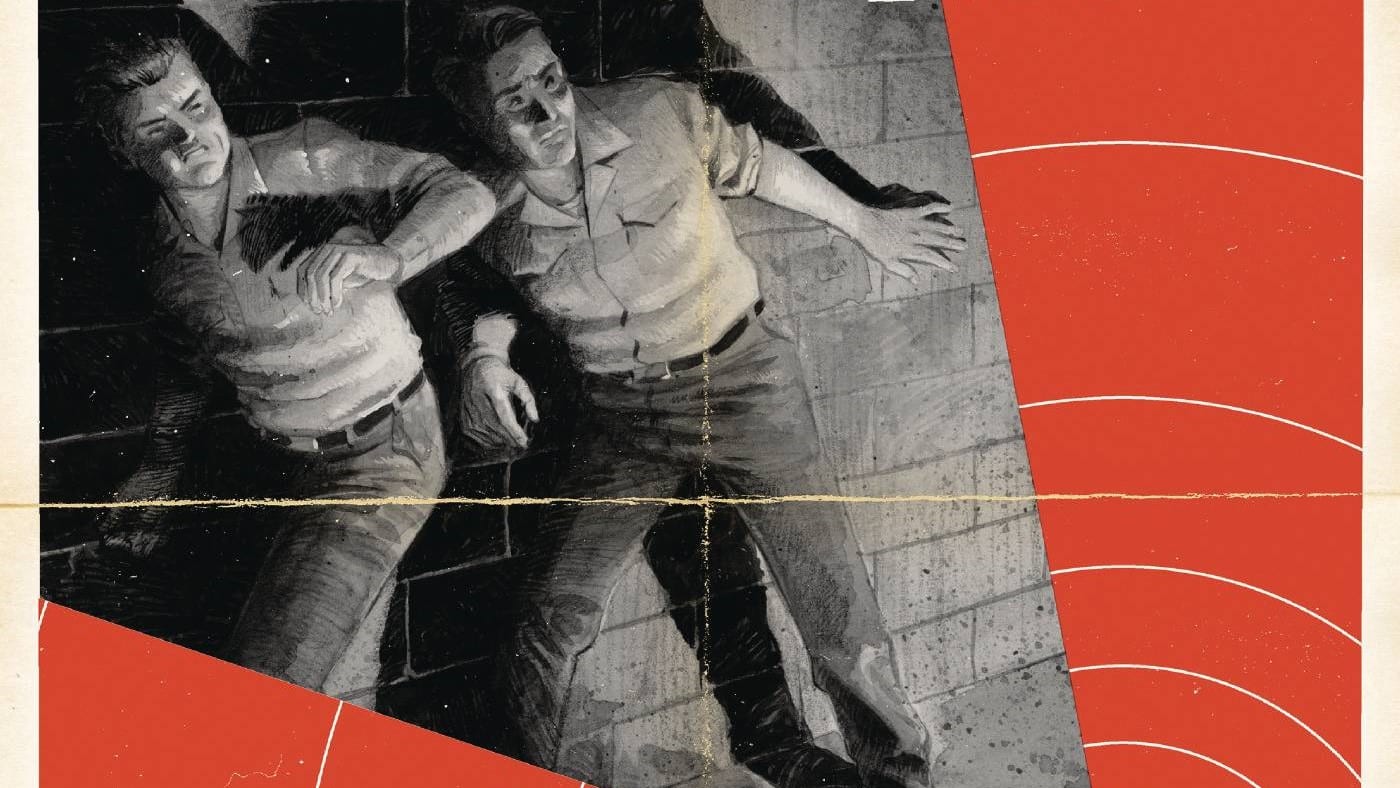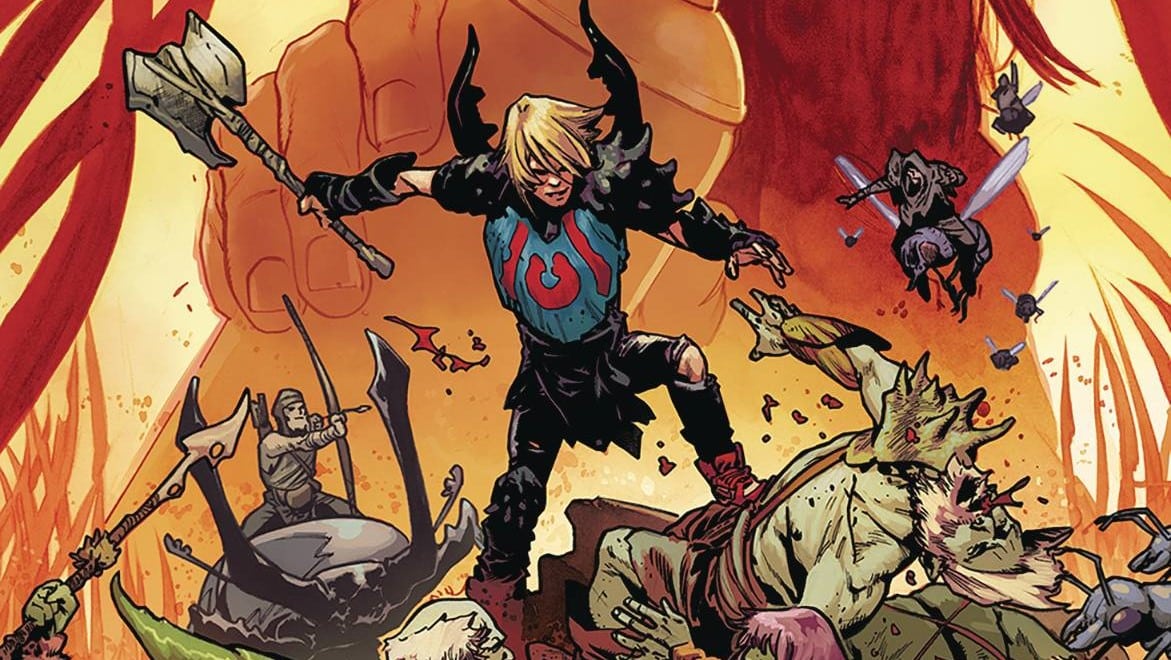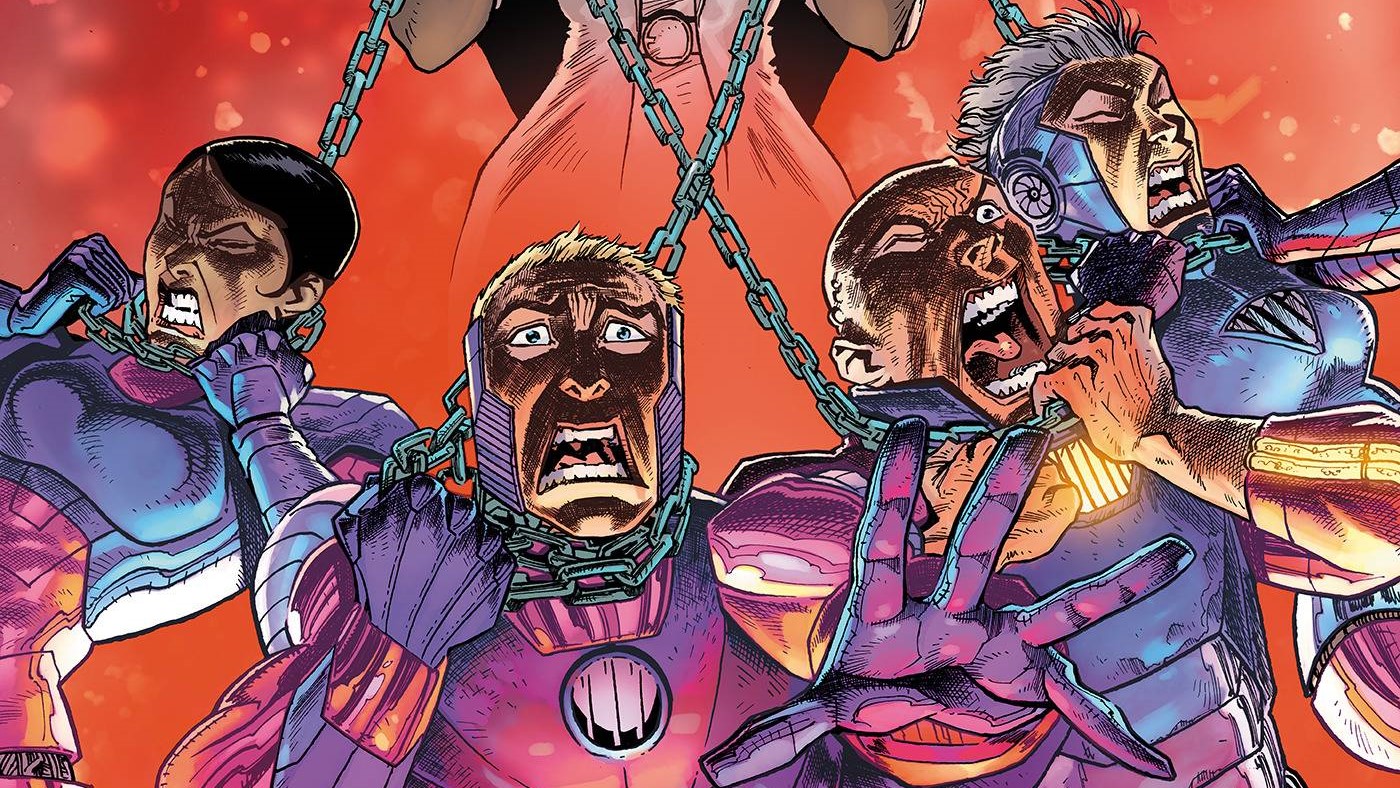Zachary Jenkins: It’s here, the biggest indie launch in a very long time. Donny Cates, possibly the creator with the most heat in the direct market right now, continues with his established collaborator Geoff Shaw to tell a story about superheroes. It’s a big, meta, high-concept tale that is blessedly not told in a nine-panel grid. Dan, are you ready to crossover with me?
Dan McMahon: Ready is a strong word in this case, but I am prepared to cross the streams. I know there are a ton of people excited for this book. I am a huge fan of the nine-panel grid and comics that make me feel sad, but this made me feel a whole lot of other feelings. I am ready to go feet-first into hell, my friend.
Super Hero-Mega-Summer Event

ZJ: Cates opens this book evoking Multiversity-era Grant Morrison something fierce. He argues that Detective Comics Comics character and cultural icon Superman is more real than you and me. That stories are the real reality, and like a virus, they are spreading; quite literally in this case. Three years ago in Denver, every superhero — Savage Dragon, Batman, Spider-Man, all of them — exploded into our reality for a massive, bloody crossover. Thousands presumed dead from the carnage. Honestly, I thought the galaxy-brain idea that maybe superhero fights have collateral damage died off with Batman V Superman: Dawn of Justice and Captain America: Civil War making literal billions of dollars mining that exact concept. Dan, what are your thoughts on the inciting incident here?
DM: Bud, I gotta be real honest and say that seeing horrific tragedies mixed with something I find my escape in isn’t great. I totally get that big blockbuster events have fallout, but imagining them killing real people (they’re realer than me, I am told) just isn’t something I love. Mass tragedy isn’t something I find much narrative value out of when I fear for the life of the people I love every day when they go to work.
ZJ: There’s a saying: “A single death is a tragedy; a million deaths is a statistic.” From a narrative standpoint, I don’t see a lot of value in mass destruction like this. Watchmen, which this book wants to be compared to, opens its final chapter with the annihilation of New York City. But that moment is only powerful because Moore and Gibbons took the time to make you care about small individuals in the city. In the opening here, there is gore and devastation, but we just know it was a big number. We have no scale, no reason to care about the loss of lives.
DM: I do want to dig a little more into that “heroes are just as real as you” narrative because I do think Morrison does that justice sometimes. These characters are modern epic heroes like Hercules or Achilles, but so far in this story, it’s just a hollow metaphor used to make neat references. Do you think these sort of tongue-in-cheek, “look who I just referenced” bits strengthen his story, especially when they’re used to cause mass violence?
ZJ: I think there is a lot of symbolic power in “superheroes.” There’s iconography and a shared cultural understanding of them that makes for easy shorthand. You can imply that a character is Batman-like and have a lot of heavy lifting done for you, allowing a writer to go in new directions and use that iconography as an easy comparison point. What Crossover does is more akin to a Family Guy cut-away gag. It not-so-obliquely makes a reference and thinks that’s enough. It isn’t using these myths, these modern legends, to tell a story. Cates is using them to remind us that he too knows who Superman is.
Hated & Feared

ZJ: The story here is really centered on a cosplayer and comic shop employee named Ellipses. We are told this is more or less about her. You see, because of the crossover, superheroes are demonized and anyone who is a fan of superheroes is oppressed. Cates is not subtle about this. She is introduced getting a beer bottle thrown at her for wearing a domino mask. We see infamous homophobic slogans twisted to be anti-superhero. A “Wertham Was Right” shirt is ironically worn by a comic shop employee. Elle literally drops the X-Men’s hated and feared tagline in reference to comic fans.
DM: The recycling of hate speech with the “God Hates Masks” tagline was so jarring to me. It’s a reference to a slur hurled at the queer community, popularized by the Westboro Baptist Church. My entire life I have seen those signs at events, rallies and the funerals of the people these words are intended to hurt. Having it used to talk about superheroes is just wildly out of touch with just how much pain even the thought of something like that can cause.
ZJ: It’s so bizarre to me, a day after the election, to put out a book that is centered on the idea that fans of superhero comics are the real oppressed population. The truth about comics readers, specifically the ones who read through the direct market, is that they are overwhelmingly cis straight white men. You know, the demographic who aren’t being disproportionately killed by police, who aren’t impacted by a gender pay gap, who have always been able to marry whom they want, and who can take a shit in their own damn bathroom of choice without harassment. So to write a story telling that demographic that they are really the oppressed ones? It’s offensively out of touch with reality.
This is the lie that leads to neo-Nazis marching though Charlottesville chanting “Jews will not replace us.” It’s the lie that leads to a teenager murdering two people who were protesting the unjust killing of a Black man by police. It’s the same lie as saying the “gay agenda” is destroying traditional family values. I’m not saying Cates thinks any of these things are good or right. However, pulling this back to his opening to the book, stories are a virus, they unassumingly burrow their way into hearts and minds and inform new opinions. The message of Multiversity was to be careful of the comics you consume because you are choosing to let those ideas in. I think we honestly need to ask if the ideas in this comic are the right ones to let it.
DM: The whole ham-fisted idea that comic fans are oppressed is a narrative that made me think of a certain group of comic fans that are anything but. A group of mostly cis straight white males who will openly spew venom and hatred at anyone who disagrees with them. They frame this as the “SJWs” oppressing their views and erasing them while in reality they’re truly a hate group who will stop at nothing to undermine marginalized people at every turn.
ZJ: It also rings false to my experiences in the comics community. I was a moderator on /r/comicbooks during the height of Comicsgate. I experienced, firsthand, the harassment and hate speech spewed by comics fans. I’ve been to enough comic shops to see how uninviting the environment is to anyone who doesn’t align with a very specific set of characteristics. It’s hard to stomach the idea of the oppressed comics fan when I’ve spent time around the gatekeeping, vile, hateful fans in the world.
DM: I have spoken to creators who would get their asses kicked on their morning commute if they were seen with a comic when they were young. Now, their children and all their friends are obsessed with superhero media. It’s an industry in itself. There are countless movies, television shows and video games being churned out on the backs of these capes. This whole mindset feels stuck in the muck of the past, a truly outdated idea coming out in a world where every new superhero movie breaks box office records.
ZJ: They are the most dominant thing in pop culture and have been that way since their inception, even if the popularity of the comics they originated in has ebbed and flowed over the years. Superman has been a household name since before my grandparents were born. Batman, Hulk and Wonder Woman were icons before I was born. Saying superhero fans are oppressed is like saying football fans are oppressed. It’s a laughable misunderstanding of the reality of the situation.
The Devil’s Advocate

ZJ: I kinda think the most perfect thing about this book is that it ends with two ads for the Donny Cates brand. Not just his upcoming comics (though those are there, too) but very literally his personal podcasts and merch. The marketer in me is honestly impressed at how brazen this is and how well he has positioned himself and built a fiercely loyal fanbase. If anything, it reminds me of the original Image Comics creators. For those who don’t know, Image was founded by ’90s superstars like Jim Lee, Rob Liefeld and Todd McFarlane. They had two massive advantages in the cult of personality around them and the speculator market that adored new #1s and new characters. Sound like anyone we know?
DM: I have made this comment before. I compared Donny to The Rob on Twitter. After a bunch of not-nice comments, I even explained that I meant he was the modern comic rock star. Which he 100% is. I stand by this even now because Donny is just cool as heck. He wears cool clothes, he creates cool characters, and people are head over heels for him. After the first wave of comments, they started to get worse with people tossing some colorful language my way for saying something. I deleted it because I saw it could be misconstrued. From then on, I was more mindful of the fact that my words had a lot of power even if I don’t get it. Words can do so much more than we expect when we type them out.
ZJ: But, also like The Rob, Cates is all about the personal brand. If there was a Levi’s commercial in 2020 featuring a comics personality, you can bet it would be him. That level of self-promotion inspires cynicism, especially when a writer is trying to tell an “important” story and absolutely drops the ball in the specific ways this book does. To be clear, I don’t dislike Cates as a writer. I think God Country is fantastic and his Venom can be a lot of fun. I’m glad comics has a personality who can be successful! But this book and everything around it left a sour taste in my mouth.
Before the ads, Crossover ends with a message of “hope.” It’s the same message DC spread during its Rebirth era. It’s what Superman stands for. Unfortunately, hope has to be in something, and this book says to put that in a fictional character owned fully by AT&T, a multinational conglomerate holding company based in a tax haven. It’s hard for me to see this as anything other than a crass move by a great promoter to tell his audience that the things they care about are the important thing and they should buy more of his products to get that serotonin hit.
DM: I can understand the message that is trying to be told with this book, I see it. It’s an idea that does not have a body or weight to it. It’s hollow as of issue #1, a narrative that cheapens the real-life monsters that the oppressed constantly face. I wish I felt hope at the end of this issue, I truly do. I believe that S means hope in the very bottom of my heart, but I don’t think it’s in these pages.







